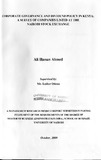| dc.description.abstract | Corporate governance exists to provide checks and balances between shareholders and
management and thus to mitigate agency problems. Hence, firms with better governance quality
should incur less agency conflicts, and managers should be less likely to adopt a sub-optimal
dividend policy. As a result, the quality of corporate governance should have an impact on
dividend policy.
There has been renewed interest in the corporate governance practices of modern corporations,
particularly due to the high-profile collapses of a number of large U.S. firms. There is evidence in
the finance literature that tends to support the hypothesis that the patterns of corporate dividend
payout policies vary tremendously between developed and transition markets. In developing
countries, little studies have been done to establish the correlation between corporate governance
and dividend policy. For these reasons, a study on this relationship between dividend policy and
corporate governance in a transition economy offers an interesting subject and complements the
existing corporate governance literature.
The fundamental premise of this study is that there ought to be an economic association between
corporate governance quality and dividend payouts. This study provides empirical evidence on the
association between aggregate governance quality and dividend payouts. Review of the literature
provides a theoretical framework on corporate governance and dividend policy. To test whether
corporate governance practices determine the dividend policy in the companies listed in the
Nairobi Stock Exchange, we compose quantitative measures on the quality of the corporate
governance for these companies.
The regression research design methodology was used to assess the relationship level between
corporate governance standards and dividend policy. The study sampled 38 companies listed in the
Nairobi Stock Exchange (NSE), and used secondary data obtained from financial reports, and
companies’ annual reports. The data obtained were qualitatively analyzed to establish the level at
which the company Transparency Disclosure Index (TDI) affects dividend payouts. These were
summarized in form of research findings, recommendations, conclusions and suggestions of areas
for further research. The findings demonstrate that an increase in the TDI, representing corporate
governance practices, brings about a statistically significant increase in the dividend payout ratios. | en |

